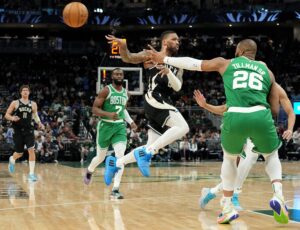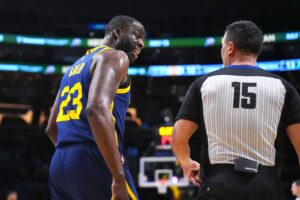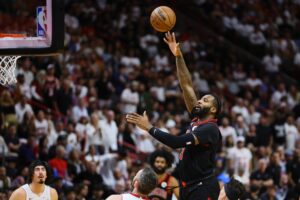Last Friday I had the pleasure of interviewing Marc Cornstein, the founder and president of Pinnacle Management Corp., a full-service athlete representation firm that handles contract negotiations as well as providing marketing, financial and personal services for professional basketball players. Marc is a certified NBA and FIBA licensed Player Agent. His most notable clients include Metta World Peace, Samuel Dalembert, and Darko Milicic.
Marc and I had the opportunity to discuss a wide range of topics, including life as an agent for NBA players, his opinion on one of the most scrutinized basketball decisions in NBA history, and how he sees the NBA continuing to expand internationally.
Interview With NBA Agent Marc Cornstein
When founding your company, what strategies did you take to earn the respect, trust, and ultimately the business from your potential clients? What were your greatest challenges?
I think in any client related business, there’s no magic formula for earning trust and respect. I think that’s something that’s earned over time. I formed a niche of concentrating on Eastern European athletes, specifically from former Yugoslavia, which at the time was going through a Civil War. I had strong access within countries in that region, whether it be Serbia, Croatia, or Slovenia, but there’s no magic answer for how you earn respect. As an agent you build a track record, then hopefully you earn respect with the work that you’ve done, and your reputation grows over time. When you’re starting off, it’s really just a matter of having something that clients see in you and in the company that they admire, that they like, and that they are willing to take a chance with.
What is the process like when your client is a free agent? How many organizations are you usually in contact with for a given player, how does the search get narrowed down, and what tactics do you use to negotiate with team representatives?
Well again, as with most of these questions, this is not a formulaic business, so there is no one set path for how you deal with free agency. There are a number of factors that go into free agency negotiations. The first thing to be considered is if the player’s current team has a desire to keep him, or if they have a desire to let him go. It always helps with leverage and negotiating if the player’s current team has a desire to keep him. So that would have a huge influence on the process.
As the agent, you want to make sure you know what the priorities are for the player. If the priority is earning the largest contract, that might lead to a different free agency process than if the player prioritizes where he is going to get the most opportunity. Or, you know, logistics, or desire of playing in a certain city. I work for the player, so I need to make sure to have those priorities in place. If the player is a free agent, and size of the contract is the top priority, then obviously you have to see where there is money available with the salary cap. The cap will restrict what certain teams can or cannot offer. If you’re talking to three teams and two of them are already over the salary cap, with the third team significantly under the salary cap, that’s going to have a huge impact.
Since there are only 30 teams in the NBA, I always prided myself on knowing the management and sometimes the ownership of all 30 teams. I would really do a lot of homework and research as to what each team was looking for. I would put myself in the other team’s shoes, not just my player’s or my perspective. I wouldn’t deal with all 30 teams the same way because, just as it is with players, all teams have different priorities as well.
To follow up on the previous question, what is the biggest difference between negotiating with NBA teams versus teams overseas?
The biggest difference is that there are a lot more rules and regulations in the NBA. There is no salary cap in Europe or Asia, and there are no restrictions in terms of what types of benefits can be given to a player overseas. An offer can be made overseas that just can’t necessarily be made in the NBA. Contracts in the NBA are extremely standardized and there are many restrictions and limitations, just based on the collective bargaining agreement and cap restrictions that you don’t have in Europe. So, I would say that is the largest difference. Obviously the money gap is pretty significant as well. There is significantly more money being offered by NBA teams than by teams in Europe or Asia.
The relationship with a client and agent is very dynamic in the professional world. Which clients did you form the greatest relationship with? What made these relationships so great?
Well, we’re never supposed to say we have a favorite client, just like you don’t say you have a favorite child as a parent. But I can say I was lucky in that I had a number of guys who I worked with throughout the duration of their careers and the duration of my career. Some of those players include Samuel Dalembert, Primoz Brezec, Darko Milicic, Scoonie Penn, and Zoran Planinic. I worked with these players for 10+ years and continue have a really good relationship with them even if they’re no longer playing. Those are the players you obviously form the strongest bond with.
How does that relationship develop? Again, there’s no magic formula for that. It’s important for personalities to mesh. I was always brutally honest with my clients, and I was never a big believer in sugarcoating things. I was always extremely blunt and direct with guys I worked with. Truth comes out whether you want it to or not, so I never saw the benefit of dancing around certain things. So, I was always direct and open with my guys, and I think the players you form the strongest relationships with are the ones who are direct and open with you as well, whether they’re happy or disappointed with something.
You had mentioned Samuel Dalembert as one of the players you’ve formed a close relationship with, and he obviously spent much of his career with the Philadelphia 76ers. I’m assuming you formed a relationship with former Sixers general manager Billy King. Do you think he was treated fairly by the media after the infamous Pierce/Garnett trade with Danny Ainge?
Unless you’re directly in the middle of a situation, it’s very hard to know all the circumstances. That’s not dodging the question, but it really is the truth. What I mean by that is no one knows for sure what ownership dictated with regards to a mandate. It clearly went down as one of the most visible trades of the past 25 years and obviously put the Celtics and the Nets down two very different paths. How much of that goes on Billy King versus ownership or the rest of management? That’s hard to say unless you’re in the middle of it. But look, he was the top basketball decision maker, and as you take the credit when things go well, you typically take the blame when things go poorly. Since that trade played out the way that it did, he will always have his name attached to it.
As a Nets fan, I feel obligated to ask this follow up question: How impressed are you by what Sean Marks has done with the roster in Brooklyn since he took over?
Well he inherited a very difficult situation, not only with them not having very much talent but also with the lack of draft picks going forward. He was groomed well, and he is off to a very good start. I would say him and Coach Atkinson have done impressive jobs with not the easiest of circumstances.
You of course originally built your agency primarily through international players, and we have seen a significant increase in the number of international players in the NBA. Is it simply because we have more technological access to recruit internationally, or are players simply playing more basketball in other countries and therefore foreign countries are producing better basketball players?
Well, I think it’s a number of factors. If I had to simplify that, I would say the biggest factor is that basketball has become a global sport for quite a while. You have talent emerging, superior coaching, and systems developing throughout the world. The NBA is the premier basketball league in the world, and they’re going to find talent wherever it is. It doesn’t matter which corner of the world the talent is coming from. Now I think technology certainly helps with that, so that is a factor, but the sport of basketball second only to soccer has become a global sport. The NBA has done a wonderful job marketing themselves in large countries like China and now in India, which has brought the popularity of the sport to new heights and has introduced this sport to a whole new wave of players.
Do you think this trend of international players is going to continue at the rate that it has for the NBA?
Obviously it plateaued to a certain degree in most of Europe. The sport has been very popular there for a long time now. You’ve kind of pioneered generations of players that have made it popular for quite a while. I don’t think you’re going to see the same explosive and exponential growth in Europe as you did 20 or 30 years ago, but it will continue a steady climb. India is maybe the country with the most explosive growth right now, especially considering how enormous their population is. But you’re really seeing worldwide growth, and yes, I think you’re going to see it continue to grow. Again, technology plays a huge part in that. Now with streaming you can watch the NBA on your phone anywhere in the world, so that certainly helps the cause.
To wrap this up, looking towards the future with regard to style of play and business operations, how do you think the the NBA will be different in 20 years?
Wow, that’s a great question. That’s a tough one to answer. I don’t know that I’m clever enough to know what the new trends are going to be in the NBA. Twenty years ago, with regard to the style, big men were considered the most important players on the court. Conventional wisdom suggested you needed a dominant big man to compete. Typically if you could get a franchise big man, that’s where teams would look.
But now the league has evolved where it’s much more perimeter oriented. I would say the NBA is now a point guard driven league. Teams look to spread the floor and create matchup issues, and now even the bigs that you see are really perimeter bigs. The top big men are now typically out on the three point line shooting threes as much as they are, if not more than they are playing with their back to the basket.
Going forwards, I think analytics will continue to play an important role. That certainly happened a lot in the last 5+ years, and the successful teams have integrated analytics and figured that out best. I also think nutrition and the athleticism of players will continue to improve as time goes on.
In terms of where the business of the NBA will go in 20 years from now, I think the next frontier is probably overseas. I don’t necessarily think you’ll see teams positioned around the world since travel makes that challenging, but I think that is the next level of growth. I think you will continue to see the NBA try its best to branch out internationally even more so than it has to this point.
Main Photo
Embed from Getty Images






